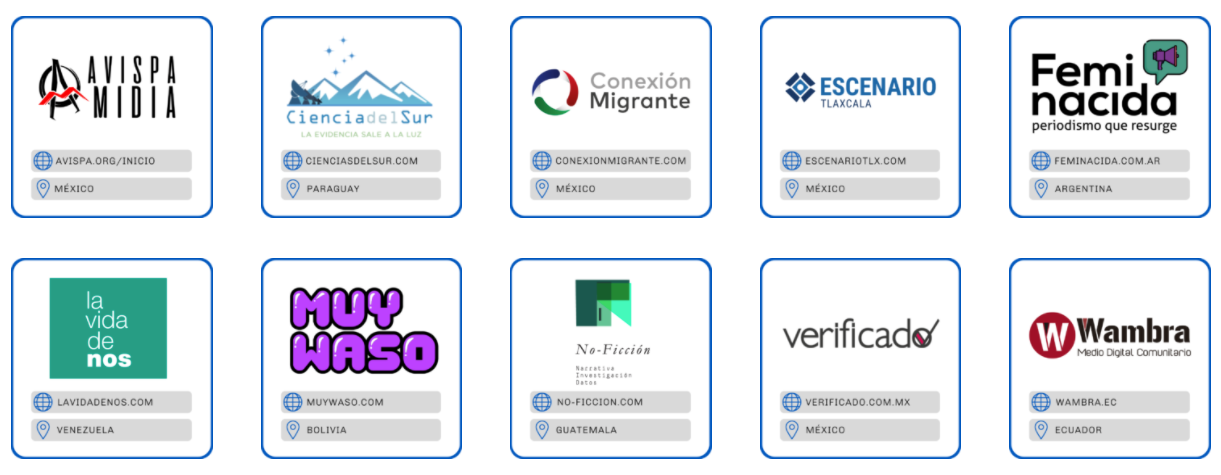Covering topics in information deserts or working with communities rendered invisible. These were some of the proposals that marked the winning media selected for a highly sought mentorship program.
The objective is to strengthen the structure and diversify the business model of 10 young digital native media from Latin America so that they become self-sustaining. That is what the GNI Startups Lab Hispanoamérica is all about, which was created and launched in mid-2021 by the journalistic organization SembraMedia, with the support of the Google News Initiative.
 Digital media from Latin America, winners of GNI Startups Lab Hispanoamérica. (Screenshot)Selected from among 350 applicants from 18 Spanish-speaking countries, the ten winning media are vispa Midia, Conexión Migrante, Verificado.MX and Escenario Tlaxcala from Mexico; Ciencia del Sur, from Paraguay; Feminacida, from Argentina; La Vida de Nos, from Venezuela; No Ficción, from Guatemala; Revista Muy Waso, from Bolivia; and Wambra, from Ecuador.
Digital media from Latin America, winners of GNI Startups Lab Hispanoamérica. (Screenshot)Selected from among 350 applicants from 18 Spanish-speaking countries, the ten winning media are vispa Midia, Conexión Migrante, Verificado.MX and Escenario Tlaxcala from Mexico; Ciencia del Sur, from Paraguay; Feminacida, from Argentina; La Vida de Nos, from Venezuela; No Ficción, from Guatemala; Revista Muy Waso, from Bolivia; and Wambra, from Ecuador.
"The chosen media work with communities that are not represented in the daily agenda of the media in each country and hence the main objective of this program emerges, which is to strengthen the creation of new media voices in Latin America," Florencia Aza told LatAm Journalism Review (LJR).
From the beginning, Aza, project director from SembraMedia and program coordinator, pointed out that the media accelerator makes a cross-sectional evaluation of the organization to establish measurable and concrete objectives and draw up an action plan that helps its monetization.
The winners of this first edition of the program will receive support for six months from the team of SembraMedia consultants which will follow up on the strategic plan drawn up for each, receiving feedback and measuring their impact over time to make strategic decisions, Mijal Iastrebner, CEO and co-founder of Sembramedia, told LJR. The selected media will also have specialized consultancies for each of their areas of work.
In addition to the six months of mentoring, the accelerator will offer between U.S. $10,000 and $30,000 in financing to the winners.
According to Aza and Iastrebner, the selection process for the winning media was not easy because the region's digital native media ecosystem is of high quality and has a diversity of proposals.
"Continuing to strengthen the ecosystem and contribute to making young media more sustainable: these are some of the objectives of the Startups Lab. We believe that the mentoring of specialists in their areas, added to the expertise of SembraMedia and its network will be of enormous help to enhance the mission that each of these media has in its different regions,” said Juan Manuel Lucero, News Lab Lead Hispanoamérica, in the press release that announced the winners in early September.
Acceleration expectations
LJR collected the comments of some of the winners, who expressed their expectations regarding the results of the program in their media.
"We want to grow to reach more migrants, expand our operations in Latin America, where there is a great need for useful and quality information for the large migrant community in the region," Patricia Mercado Sánchez, founder and general director of Conexion Migrante, from Mexico, told LJR.
For Mercado and her team, this award has a double meaning: that her company is taking “firm steps” in terms of strategies and in working with its audiences. In that sense, they will seek to strengthen their commercial and administrative area with mentoring.
Since it was founded in 2016, Conexión Migrante does services and solutions journalism, offering tools and advice to migrant populations in need, mainly to migrants from Mexico and other Latin American countries who are living in the United States.
Also from Mexico, Avispa Midia, sees winning the award as an opportunity to strengthen its strategic plans in order to continue addressing the various topics it covers.
"At the end of this program, we hope to have strengthened the foundations of our financial self-sufficiency and to take our journalistic production to a new scale, especially investigative topics and multimedia formats," Aldo Santiago, editor of Avispa Midia, told LJR.
Avispa Midia is a collective made up of independent communicators and investigators who emphasize photography, investigative reporting and documentaries.
From Bolivia, Muy Waso seeks to consolidate its journalistic project as something comprehensive, of quality, independent and self-sustaining. The team feels recognized for having been selected by the accelerator, despite having been founded just three years ago.
"We are going to take advantage of all the tools that we obtain from the program to continue creating and testing sustainability mechanisms that are adapted to the Bolivian market," Michelle Nogales, co-founder and general director of Muy Waso, told LJR. "In our country, journalistic work is very precarious, so our main objective is to make ourselves sustainable in the long term and offer pay that is fair in regards to the talent of our colleagues."
The team do narrative, data, investigative and opinion journalism, with a social and feminist focus.
And in Argentina, Feminacida, a self-managed collective that was born in 2018 to do journalism with a feminist perspective, considers that being elected is a recognition of the need for more feminist media led by women and people from the LGBTQ+ community.
Likewise, "it implies a very great professional leap, being able to count on the tactical advice of specialists and with more resources for the development of the media outlet," Solana Camaño, editor and coordinator of educational projects at Feminacida, told LJR.
"When the program ends, we hope to be more directed towards a long-term sustainable development of our project, with new ambitions, tools, resources and strategies to carry forward feminist journalism for the social transformation in which we believe," she said.